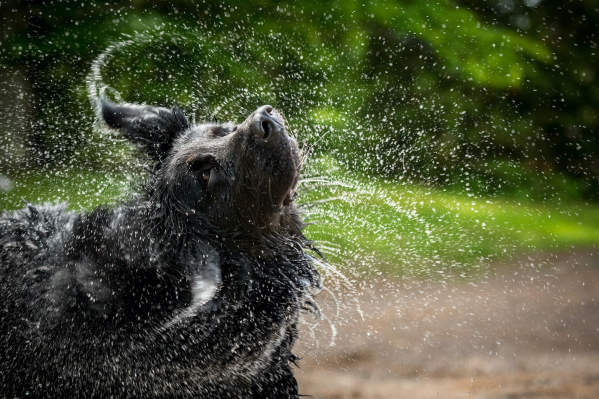There are a lot of reasons why your dog may be shaking. Sometimes it might be as simple as drying off after a jump in the lake. Other times, however, it might not be obvious why your dog is jittery or trembling. Before you spend hours on the internet, panic-searching for an answer, you can learn about the common reasons your dog may be shaking, and what that means for you and your pup.
You know your dog well, so you can assess whether this shaking is common or brand new. Some of the below reasons your dog is shaking do require a vet visit. Some of the below reasons are also nothing to worry about. If you're concerned at all that your dog may be in danger, do not hesistate to seek professional help.
They’re cold
Just like humans, dogs can shiver if they’re too cold. If you’re in a place with frigid winters or have a dog with short fur, make sure they’re kept warm in winter months by limiting the time they’re outside or by making sure they have some winterwear to keep their bodies warm.
They’re anxious, stressed, or excited
If your dog is particularly nervous, you might find them shaking after a stressful event, such as thunder, a visit to the vet office, or anything else that might upset them. On the positive side, your pup may also shake with excitement when they’re particularly happy, such as when you’ve come home from a long day of work and they’re glad to see you. If you think your pet is frequently shaking because they’re scared, it’s likely worth a visit to the vet office to find out if their trembling is a symptom of a broader stress or anxiety disorder. If it is, your veterinarian can then provide guidance, including possible medication, to help reduce the level of stress and anxiety your pup feels.

They’re In Pain
According to Dr. Natalie Waggener at South Boston Animal Hospital, many dogs shake when they’re in pain. The source of the pain can be obvious, of course, if they’ve cut themselves or are limping. But pain-related shaking can also occur if your pet has a chronic condition that may not be immediately apparent. If your pup is shaking and also showing other signs of pain, like whining, barking, or aggressive behavior, you should make a vet appointment immediately in order to get them checked out.
They’ve Eaten Something They Shouldn’t Have
Shaking in your pet can also be a sign that they’ve ingested a toxin or a poison. If your dog is shaking and has other symptoms like lethargy and vomiting, you should consider this a medical emergency and head to your vet immediately. If you have a good guess as to what your dog may have ingested, be sure to bring it with you to the vet so they can treat your pup accordingly.
They Have A Medical Condition
If your dog shakes frequently and there are no obvious outside factors making them cold or stressed, your pup may have an underlying medical condition. There are several medical conditions that can cause shaking, some of which are quite serious and require immediate vet attention. Billings Animal Family Hospital lists several major ones, including:
Low Blood Sugar, which is often found in smaller breeds and in dogs who are diabetic.
Low Calcium Levels, which is usually found in nursing dogs who have their calcium stores sent to their milk, which leaves the rest of their body depleted. If you have a nursing dog who also shows signs of panting, stiffness, and neglect of her puppies, you should consider this a medical emergency and head to a vet ER immediately.
Addison’s Syndrome, which is a disease that impacts a dog’s adrenal glands. Dogs with Addison’s disease have less cortisol in their blood and also may have abnormal levels of electrolytes in their system. These imbalances can cause shaking as well as other symptoms, like lethargy, diarrhea, and trouble gaining weight.
Seizures, which can happen if your dog has low blood sugar. Extreme seizures are also accompanied by chopping of the teeth, urination, or defecation. If you dog has what you believe to be a seizure, you should make a vet appointment immediately.

It just might be part of your dog’s DNA
Some smaller breeds, particularly those with white fur, are also known to shake uncontrollably for no specific reason. This ailment is commonly known as “little white shaker disease” because small white dogs like Westies and Bichons are prone to this condition. If you think your pup may fall into this category, it’s still worth a trip to the vet office to rule out some of the more serious causes of shaking outlined above. And if it is little white shaker disease, your veterinarian can still also prescribe some oral medications to help alleviate it.
So the next time your pup gives a shake, be aware of all the factors that may cause it. Hopefully those shakes will fall in the relatively benign categories of your dog being cold or overly excited, but no matter what the reason turns out to be, you’re now armed with information on what can be done to treat it.
